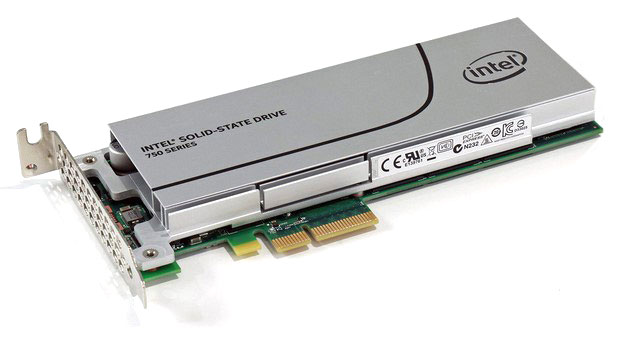Intel SSD 750 Series PCIe SSD Review: NVMe For Desktop Performance
 It's easy to get excited about PCI Express Solid State Drives, because they're so damn fast. Then again, we've seen a lot of these types of drives here. After a while, to be frank, even though we're measuring throughput in Gigabytes-per-second, some products can look more ho-hum than others, especially over time. And so, somewhat surprisingly, Intel's new SSD 750 pretty much blew us away with its flat-out blistering throughput in every condition we tested it under. When we look back at its scores and then consider its price tag of under $400 for a 400GB drive and a smidge over $1K for a 1.2 Terabyte drive, we get even more excited. The Intel SSD 750 is still pricey compared to standard SATA SSDs but compared to other fast PCIe solutions it's actually one of the most reasonably-priced products on the market currently. These two high level attributes alone, top-shelf performance, combined with competitive pricing, add up to what could be the best value in high performance desktop storage on the market. Yes, this SSD is that good and it should be available in retail channels in the next few days.
It's easy to get excited about PCI Express Solid State Drives, because they're so damn fast. Then again, we've seen a lot of these types of drives here. After a while, to be frank, even though we're measuring throughput in Gigabytes-per-second, some products can look more ho-hum than others, especially over time. And so, somewhat surprisingly, Intel's new SSD 750 pretty much blew us away with its flat-out blistering throughput in every condition we tested it under. When we look back at its scores and then consider its price tag of under $400 for a 400GB drive and a smidge over $1K for a 1.2 Terabyte drive, we get even more excited. The Intel SSD 750 is still pricey compared to standard SATA SSDs but compared to other fast PCIe solutions it's actually one of the most reasonably-priced products on the market currently. These two high level attributes alone, top-shelf performance, combined with competitive pricing, add up to what could be the best value in high performance desktop storage on the market. Yes, this SSD is that good and it should be available in retail channels in the next few days. The SSD 750 is not without one somewhat significant caveat, however. The fact of the matter is, at least currently, the product isn't compatible with legacy motherboard platforms in the market that don't support NVMe in the BIOS, at least as a boot drive. This likely includes many X79 and Z87 motherboards out there, though you should still be able to use the product as a secondary drive. However, as it stands today, as a boot drive, the SSD 750 is only going to work on X99 or Z97 motherboards and next generation platforms. Though you'll definitely want to update to the latest BIOS revision, to ensure you have the most current generation of UEFI BIOS compatibility with NVMe support.
Other than its more limited system compatibility list, the Intel SSD 750 Series is our new favorite PCIe SSD card here at HotHardware. It's crazy fast across a wide range of workloads, has great endurance specs, and drops in at a price that will make the competition cringe. This is one product that is a no-brainer HotHardware Editor's Choice winner and it will be exciting to see what Intel can do next with this family of drives moving forward.

 |
 |
|
|








